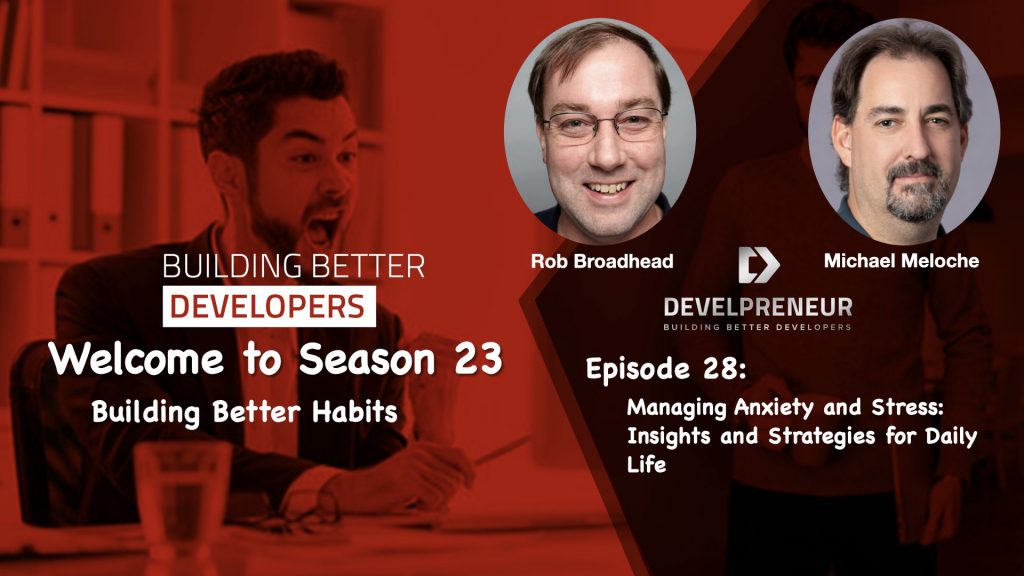In a recent episode of the Building Better Habits podcast, hosts Rob Broadhead and Michael Meloche tackled the important topic of managing anxiety and stress, especially in high-pressure work environments. This episode explores practical strategies for identifying, understanding, and managing anxiety and stress through effective habit-building. Here’s a summary of their insightful discussion.
Understanding Anxiety and Stress
The episode begins by distinguishing between anxiety and stress. While stress is often tied to external pressures like deadlines and performance goals, anxiety is more internal, stemming from uncertainty, fear of the unknown, or persistent worry. Michael explains that anxiety can linger long after a stressful event, manifesting as repetitive thoughts and a heightened sense of vulnerability.
For developers and professionals, managing anxiety and stress is crucial. Common triggers include unstable software systems, tight deadlines, or the fear of failure in high-stakes situations like healthcare or public service. Rob emphasizes that while stress can sometimes be motivational, unchecked anxiety drains productivity and can lead to burnout.
Building Habits for Managing Anxiety and Stress
Both hosts agree that developing habits is key to effectively managing anxiety and stress. Michael shares how he has learned to identify his anxiety triggers and adopt techniques to work through them. One of his strategies is comparing current challenges to past situations, asking himself whether today’s circumstances are genuinely different or more threatening. This perspective helps to reduce feelings of overwhelm.
Rob suggests daily gratitude journaling as a powerful habit for managing anxiety and stress. Writing down three things you’re grateful for each morning can shift your mindset and help you focus on positives rather than uncertainties. Whether it’s appreciating a hot cup of coffee, a supportive colleague, or a recent accomplishment, this practice fosters resilience and clarity.
Practical Techniques for Managing Anxiety and Stress
Michael and Rob also share actionable tips for addressing anxiety and stress:
- Brain Dumps: Writing down repetitive thoughts or “what-ifs” can provide clarity and relief. Once on paper, those worries become more manageable.
- Engaging Activities: Reading, listening to music, or diving into an audiobook can help redirect focus and break the cycle of anxious thoughts. Michael advises against passive distractions like TV, which often allow the mind to wander.
- Reframing the Situation: Asking questions like, “What’s the worst that could happen?” or “Has anything truly changed?” can help reframe anxiety and focus on actionable solutions.
- Grounding in Basics: When overwhelmed, it helps to focus on essential needs—food, shelter, and safety—to remind yourself that you are okay.
Seeking Support for Managing Anxiety and Stress
Both hosts stress the importance of seeking help when necessary. This might involve talking to friends or family, exploring self-help books, or consulting with a professional therapist. Rob reminds listeners that managing anxiety and stress isn’t a sign of weakness but a common struggle shared by many.
Michael highlights the value of addressing physiological aspects of anxiety with the help of healthcare professionals. Sometimes, a small medical intervention under the guidance of a doctor can make a significant difference.
The Weekly Challenge: Build Gratitude into Your Day
To help listeners take actionable steps, Rob concludes the episode with a challenge: Start each morning by listing three things you’re grateful for. This habit not only helps in managing anxiety and stress but also fosters a mindset of gratitude and positivity. Over time, it builds resilience and allows you to tackle challenges with a clearer head.
Final Thoughts on Managing Anxiety and Stress
The Building Better Habits podcast reminds us that while anxiety and stress are inevitable, they are also manageable. Through mindfulness, habit-building, and community support, we can turn anxiety into an opportunity for growth.
As Michael eloquently states, “There’s always sunshine on the horizon.” By embracing practical habits and reframing challenges, you can take control of your well-being and productivity.
For more insights on managing anxiety and stress, visit the podcast’s website or connect with the hosts on social media. Tune in to upcoming episodes for more strategies on building better habits and becoming your best self.
Stay Connected: Join the Develpreneur Community
We invite you to join our community and share your coding journey with us. Whether you’re a seasoned developer or just starting, there’s always room to learn and grow together. Contact us at [email protected] with your questions, feedback, or suggestions for future episodes. Together, let’s continue exploring the exciting world of software development.

